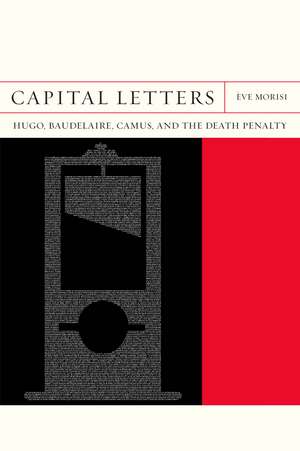Capital Letters: Hugo, Baudelaire, Camus, and the Death Penalty: FlashPoints, cartea 33
Autor Ève Morisien Limba Engleză Paperback – 15 mar 2020
Din seria FlashPoints
-
 Preț: 347.81 lei
Preț: 347.81 lei -
 Preț: 383.87 lei
Preț: 383.87 lei -
 Preț: 348.77 lei
Preț: 348.77 lei -
 Preț: 267.14 lei
Preț: 267.14 lei -
 Preț: 334.23 lei
Preț: 334.23 lei -
 Preț: 334.86 lei
Preț: 334.86 lei -
 Preț: 358.09 lei
Preț: 358.09 lei -
 Preț: 289.96 lei
Preț: 289.96 lei -
 Preț: 422.63 lei
Preț: 422.63 lei -
 Preț: 411.37 lei
Preț: 411.37 lei -
 Preț: 425.51 lei
Preț: 425.51 lei -
 Preț: 324.21 lei
Preț: 324.21 lei -
 Preț: 306.32 lei
Preț: 306.32 lei -
 Preț: 432.25 lei
Preț: 432.25 lei -
 Preț: 306.45 lei
Preț: 306.45 lei -
 Preț: 266.92 lei
Preț: 266.92 lei - 18%
 Preț: 698.23 lei
Preț: 698.23 lei - 23%
 Preț: 703.91 lei
Preț: 703.91 lei - 16%
 Preț: 664.97 lei
Preț: 664.97 lei - 13%
 Preț: 263.91 lei
Preț: 263.91 lei - 13%
 Preț: 266.37 lei
Preț: 266.37 lei -
 Preț: 305.90 lei
Preț: 305.90 lei - 23%
 Preț: 699.48 lei
Preț: 699.48 lei - 18%
 Preț: 696.89 lei
Preț: 696.89 lei - 18%
 Preț: 696.51 lei
Preț: 696.51 lei -
 Preț: 305.46 lei
Preț: 305.46 lei -
 Preț: 392.07 lei
Preț: 392.07 lei -
 Preț: 321.30 lei
Preț: 321.30 lei -
 Preț: 331.81 lei
Preț: 331.81 lei -
 Preț: 313.40 lei
Preț: 313.40 lei - 18%
 Preț: 731.26 lei
Preț: 731.26 lei -

-

-

Preț: 274.83 lei
Nou
Puncte Express: 412
Preț estimativ în valută:
52.59€ • 57.11$ • 44.18£
52.59€ • 57.11$ • 44.18£
Carte tipărită la comandă
Livrare economică 22 aprilie-06 mai
Preluare comenzi: 021 569.72.76
Specificații
ISBN-13: 9780810141513
ISBN-10: 0810141515
Pagini: 280
Ilustrații: 5 b-w images running in text
Dimensiuni: 152 x 229 x 23 mm
Greutate: 0.4 kg
Editura: Northwestern University Press
Colecția Northwestern University Press
Seria FlashPoints
ISBN-10: 0810141515
Pagini: 280
Ilustrații: 5 b-w images running in text
Dimensiuni: 152 x 229 x 23 mm
Greutate: 0.4 kg
Editura: Northwestern University Press
Colecția Northwestern University Press
Seria FlashPoints
Notă biografică
ÈVE MORISI is an associate professor of French and Francophone literature at the University of Oxford.
Recenzii
“There aren’t many scholars these days who have the erudition, rhetorical arsenal, and sensibility to give French poetry and poetics their due. Ève Morisi is one of them.” —Debarati Sanyal, author of The Violence of Modernity: Baudelaire, Irony, and the Politics of Form
“In a stunning tour de force that examines the multiple strategies deployed by Victor Hugo, Charles Baudelaire, and Albert Camus to represent and indict lethal justice and violence, Ève Morisi provides a wealth of captivating perspectives that grip the reader’s attention. Her lively analysis illuminates how these three authors use literary transgression to portray state-sanctioned killing—and thus create compelling ethical arguments grounded not in rhetorical discourse but in poetic expression.” —Kathryn M. Grossman, author of The Later Novels of Victor Hugo: Variations on the Politics and Poetics of Transcendence
"It is quite unusual to read a book that so vividly and thoughtfully illuminates the connection between the world of law and of letters. Morisi’s book is distinctive and persuasive in examining the way writers have come to terms with the death penalty and the literary devices they have deployed in so doing. Broad in scope, nuanced in argument, this book is a significant achievement and genuine pleasure to read.”—Austin Sarat, author of When the State Kills: Capital Punishment and the American Condition
“Capital punishment, in this impeccably researched and powerfully argued survey of the contrasting positions held by Victor Hugo, Charles Baudelaire, and Albert Camus, allows Ève Morisi to interweave literature, philosophy and propaganda to illuminate a fundamentally problematic relationship between individuals and governments, between empathy and idealism, and between what can be stated and what defies expression. Written with clarity and concision, this study offers a forceful contribution to an essential and timely debate about individual freedom, the demands of social order, and the limits of state-inflicted punishment.” —Rosemary Lloyd, author of Baudelaire’s World.
“In a stunning tour de force that examines the multiple strategies deployed by Victor Hugo, Charles Baudelaire, and Albert Camus to represent and indict lethal justice and violence, Ève Morisi provides a wealth of captivating perspectives that grip the reader’s attention. Her lively analysis illuminates how these three authors use literary transgression to portray state-sanctioned killing—and thus create compelling ethical arguments grounded not in rhetorical discourse but in poetic expression.” —Kathryn M. Grossman, author of The Later Novels of Victor Hugo: Variations on the Politics and Poetics of Transcendence
"It is quite unusual to read a book that so vividly and thoughtfully illuminates the connection between the world of law and of letters. Morisi’s book is distinctive and persuasive in examining the way writers have come to terms with the death penalty and the literary devices they have deployed in so doing. Broad in scope, nuanced in argument, this book is a significant achievement and genuine pleasure to read.”—Austin Sarat, author of When the State Kills: Capital Punishment and the American Condition
“Capital punishment, in this impeccably researched and powerfully argued survey of the contrasting positions held by Victor Hugo, Charles Baudelaire, and Albert Camus, allows Ève Morisi to interweave literature, philosophy and propaganda to illuminate a fundamentally problematic relationship between individuals and governments, between empathy and idealism, and between what can be stated and what defies expression. Written with clarity and concision, this study offers a forceful contribution to an essential and timely debate about individual freedom, the demands of social order, and the limits of state-inflicted punishment.” —Rosemary Lloyd, author of Baudelaire’s World.
Descriere
Capital Letters sheds new light on how literature has dealt with the death penalty by uncovering the unexpected critical dialogue in which Victor Hugo, Charles Baudelaire, and Albert Camus engaged.
